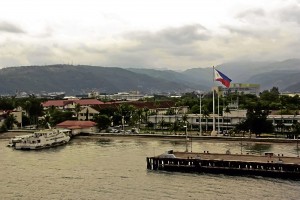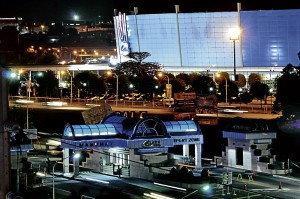Some targets met, missed

THE KAPURPURAWAN rock formation in Burgos, Ilocos Norte, is a unique attraction that has caught tourists’ attention. ELMER KRISTIAN DAUIGOY / CONTRIBUTOR
As projected by business and political leaders in central and northern Luzon at the start of 2012, the regions’ economies showed improvement with more commercial activities in the provinces.
Some targets, especially those involving infrastructure projects, however, missed the mark.
The National Economic and Development Authority (Neda) in Central Luzon did not go wrong in its outlook for 2012.
“The economic performance of Central Luzon in 2012 is on the high side,” said Victor Ubaldo, Neda’s assistant regional director.
He based this on the first three quarters’ performance of the Philippine economy, which was characterized by high economic growth rates capped by 7.11 percent in the third quarter, and the historical fact that Central Luzon is a major contributor to the Philippine economic performance.
Article continues after this advertisementAs he projected, the upgrade in the ranking of the Philippines, from 85th to 75th, in the 2011-2012 World Economic Forum Global Competitiveness Report and the anticorruption reforms drew in investments.
Article continues after this advertisement“Investments of new industries and expansion of existing ones have been registered in the three main economic zones of Central Luzon: Clark Freeport, Subic Bay Freeport and Freeport Area of Bataan,” Ubaldo said.
The year 2012 saw better accessibility to the region through a sustained support from the projects of the Department of Public Works and Highways (DPWH).

THE SUBIC BAY Freeport in Zambales and Bataan is one of the economic drivers of central Luzon in 2012. ROBERT GONZAGA
“For 2012, projects worth more than P6.5 billion were implemented through the regional office alone,” Ubaldo said. Other DPWH units completed the arterial road bypass portion in Plaridel and Bustos towns in Bulacan, flyover in the City of San Fernando in Pampanga, and the Central Luzon-Aurora link via the Pantabangan town in Nueva Ecija. These improved trading and commodity exchange.
Ubaldo said the government’s public-private partnership initiative is doing the region well through the Tarlac-Pangasinan-La Union Expressway (TPLEx), with the first section to be opened to traffic in May and through the construction of 2,885 new classrooms in the region this 2013.
Busy airport
The Clark International Airport proved to be a busy, if not preferred, airport. Weekly flights grew from five in 2004 to 296 in 2012. Passengers in 10 months alone reached more than a million.
As to agriculture, Ubaldo said 2012 was a banner year for palay production despite the floods triggered by the southwest monsoon in August. The region has retained its record as a top producer of hogs and poultry.
The manufacturing sector was vibrant in 2012, notably in electronics, shipbuilding and repair and garments.

ECONOMIC activities and investments at the Clark Freeport in Pampanga continue to boom. PETER ALAGOS / CONTRIBUTOR
In Nueva Ecija, Reynato Arimbuyutan, chapter president of the Philippine Chamber of Commerce and Industry in the province, said business started to pick up last year due to improved business climate and expected opening of road networks.
He said two shopping malls opened in San Jose City and Talavera town while two high-end subdivisions were developed in Cabanatuan City last year.
But the expected entry of investments in the western part of the province has yet to be realized because the construction of the first phase of the Tarlac to San Jose City expressway, called the Central Luzon Expressway (CLEx), has yet to start.
Brighter prospects
Bulacan Gov. Wilhelmino Sy-Alvarado said prospects for the local economy in 2013 is brighter as the government starts rehabilitating dams, roads, dikes, farms and irrigation facilities following massive flooding in the province in September and October.
The province’s experience in dealing with the tragedy, he said, has helped them to be better prepared this year.

BANGUS-RAISING and trade is a major activity in Dagupan City and other parts of Pangasinan. EV ESPIRITU
In Bulacan, the provincial government started last year the preparation of the rehabilitation of dams and flood control projects in low-lying towns.
These projects will continue this year to ensure that investments and property would be protected from heavy floods that hit the province in 2011 and 2012, local officials said.
Provincial administrator Jim Valerio said the bid announcement for the P5.7-billion rehabilitation and remediation project for Angat Dam had been published and bidding would follow soon.
Changing Ilocos landscape
In Ilocos Norte, Gov. Imee Marcos meant business when she promised to change the province’s landscape from a mere rest and recreation stop to what has become a business and tourism hub in the Ilocos region.
Last year was a major makeover for the province with the rise of major shopping malls, tourist facilities and more business activities.
But authorities made sure that Ilocos Norte’s character remains stamped in the province’s landscape with the preservation of key heritage buildings and structures.
The provincial government has stepped up its public spending with the construction of tourist assistance centers in major tourist towns from Badoc in the south to Pagudpud up north.
The trend towards 2013 will remain focused on building more tourist structures while securing Ilocos Norte’s traditional livelihood such as agribusiness complemented by private investments.
The provincial government has started embarking on a comprehensive water management plan to address water shortage, especially with the expected dry spell brought about by the El Niño phenomenon hitting the country this year.
In Dagupan City, Mayor Benjamin Lim said 2012 was a much better year for the city than 2011 because there were few calamities and the start of government infrastructure projects in the second half of the year.

THE VEGETABLE trading post in La Trinidad, Benguet, is abuzz with activity as agriculture remains a top job earner in northern Luzon. EV ESPIRITU
There may not be plenty of national infrastructure projects in Dagupan, but since it is a trading center, the income derived from projects in adjoining towns and provinces flowed into the city, he said.
On its planned marketing of marine products other than bangus (milkfish), however, the city still has to take off. Its failure to operate the fish processing plant has sidetracked its plan to add value to bangus, its top produce.
In Isabela, the proposed P100-million paper mill in Cauayan City had been shelved as negotiations between Korean investors and the Isabela government hit a snag, months after a memorandum of agreement was signed.
Despite the shelved project, the P6-billion ethanol project in San Mariano town went through. Records said the Green Futures Innovation had teamed up with the Energy Investments Corp. and Taiwanese holding company, GCO, for the production of renewable energy through the ethanol plant that would be supplied by sugarcane farmers in the province. Reports from Tonette Orejas, Carmela Reyes-Estrope, Anselmo Roque, Villamor Visaya Jr., Cristina Arzadon and Yolanda Sotelo